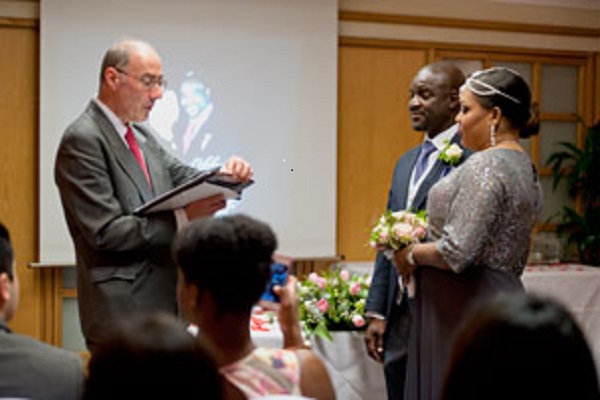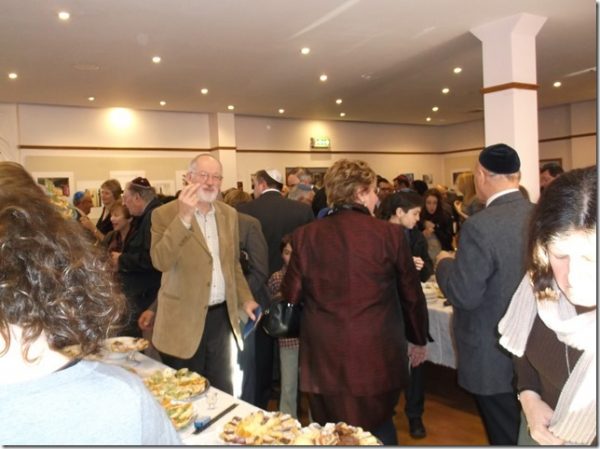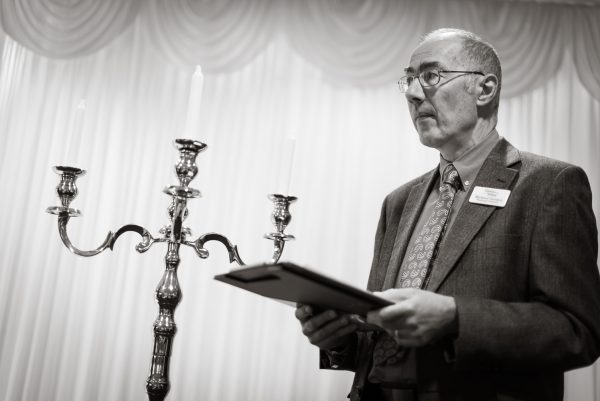
by Michael | Aug 27, 2019 | Blog
Weddings are
not what they were. That doesn’t mean that they are better or worse (whatever
that means) than traditional ones. It just means that there is more flexibility,
and it is therefore more difficult for me to be categorical.
One couple may have ideas who they want to participate in their event; another couple will have completely different opinions.
Without
being prescriptive, therefore, let me make a stab at defining the roles that
some people might play.
Bride and Groom
This is rather
more obvious!
The groom
will probably have a chance to welcome people as they arrive, so should not
neglect this duty – despite probably suffering with “butterflies”. He may well have
a few words to utter during the ceremony, but a lot more afterwards, if there
is a reception with speeches.
The speech
should thank both sets of relations and thank anybody who financed the wedding.
However, he should mostly be complimentary about his new wife!
The bride
will be the star of the show, of course, and her main task is to be
resplendent.
Either
during canapes (if offered) or during the meal, both bride and groom should
make an attempt to see everybody and thank them personally for attending.
As well as the groom, the bride may (or may not) have a speech to deliver.
Both may
well be expected to have at least the first dance together.
Bride’s Father
The bride’s
parents may well be footing the bill for (or at least be contributing to) the
proceedings.
It is customary for the bride’s father to welcome the guests briefly at the start of the reception and express what (we hope!) is his delight at the proceedings.
Best Man
I realise
that there are “best women” too these days, but, for the sake of simplicity, I
will refer here only to the male variety.
The Best Man
may have been involved with the preparations for some time, but, on the day, he
will be the person who liaises between the couple and the suppliers. He should
help keep the groom calm. He may have to do a favour for the groom (fetch some
water, check there’s a microphone functioning, inform the musicians that it’s
time for the entry music, or whatever).
The Best Man
may also serve as a toastmaster (“please go outside for the photographs now”
etc.).
His main
public role is probably to deliver his speech at the reception. This can be
about 10 minutes long, and, although it will presumably focus on the groom,
should not be exclusive. (Half the guests may well not know the groom.)
The speech
should be humorous (but not crude or controversial) and, while poking some fun
at the groom, should not be cruel.
Other roles
Flower-girls, bridesmaids, ushers (or groomsmen) and so on may well be included. The first two are primarily part of the procession (in and, sometimes, out), and, to quite an extent are there to look pretty and enhance the bride’s appearance. They may help with the bride’s train. Ideally, they also need to be able to walk very slowly!
The ushers
may be quite active (collecting gifts, for example, or doing errands and tasks
on the day). They may direct guests to their places and be on hand to answer
questions.
Or they might
get away with an ornamental role!
How much or how little the roles matter nowadays is down to how traditional the wedding will be. It’s certainly good to honour friends and/or relatives by including them in your ceremony. Just make sure they know what is expected of them!
You can always have a chat with your celebrant, if you’re not sure how to go about things.

by Michael | May 11, 2018 | Blog
There’s certainly a wedding guest etiquette, but it’s often unspoken. How, then, is one to know what to do and what to avoid?
Some guest etiquette is common sense. But thoughtlessness sometimes enters into it.
I know, as a celebrant, that being a guest can sometimes prove to be less than simple.
If you’re not careful, you can get it wrong – and, potentially, months before the big day!
RSVP
It’s easy to put off responding to the invitation because you’re want to be sure you are free. (Or because you forget about it!). But consider those making the arrangements. They have to book all manner of things (not least, the venue and catering), and this has to be done well in advance. Deposits need to be paid. They need to know numbers fairly soon.
If you’re able, then be one of those who responds as soon as possible.
Tweaking The Invitation
You may want to bring your child(ren), but if there is no mention of them on the invitation, then accept it. (It’s not meant as a snub, but there simply have to be limits on the numbers invited.) Obviously, the same goes for other people you may feel should be invited.
You may have a new partner, but don’t assume you can bring them. (For one thing, you might disrupt the seating plan.)
Participating
You could get asked to take on a role at the ceremony. Maybe as bridesmaid or usher. It’s an honour, so make sure you find out well in advance what the expectations are of your role. Will you have to attend a rehearsal the day or morning before or wear particular attire?
If you don’t want to (or can’t) do it, then give maximum notice Then there’s time to replace you, if necessary.
On the Day – Punctuality
Arrive well (30 minutes?) in advance – and don’t upstage the bride by a tardy, flustered entry. If you have been delayed, then you should simply wait until the end of the ceremony – just don’t interrupt it.
If you’re the Best Man, you should arrive an hour before the ceremony starts. If you’re going to be late, try and call the groom, at least, and warn him.
Dress
You will normally be given guidelines in the invitation. Go with what you are asked to wear, even if you might prefer a different style of attire.
At the Ceremony
Ushers may show you to your seat. If that’s not the case, leave the front two rows free for the family and VIPs.
Is the Ceremony “Unplugged”?
There will probably be an official photographer in attendance and his/her photos will matter a lot to the couple. It would be far better if they could show your smiling face rather than an iPhone held in the air. Take photos after the ceremony, by all means. Always respect any requests in this regard in the invitation or on the day.
Behaviour
It should go without saying that you ought to drink responsibly afterwards (and even more so, if you start before the ceremony!). Likewise, don’t trash the venue or embarrass yourself or the couple by loud or aggressive behaviour.
This is the biggest day in your friends’/relatives’ lives, so be grateful that they have chosen to include you. Enjoy the day – and enhance it for the happy couple. Make them glad they invited you!

by Michael | May 22, 2017 | Blog
Making a wedding speech (or any kind of speech, for that matter) has frequently been described as worse than death.
It doesn’t have to be that way.
As a professional presenter and public speaker, I want you to feel as confident about presenting yourself as I do when I am conducting a ceremony.
Whether it’s a business presentation or a Best Man speech at a wedding, it’s understandable that public speaking can be a major challenge for many people.
I want to offer you ten hints that can make that experience far less stressful and far more rewarding. They won’t necessarily solve all your issues about public speaking, but they will set you on the path to the confidence you need.
Content
- Be brief, rather than wordy, and be relevant. Don’t go off on shaggy dog stories or sagas that mean nothing to most of the guests
- Humour is good (provided you have decent material and timing!). Ensure you are not controversial, rude, or obscene. Avoid religion, politics and personal insults, as a general rule
- Be clear in your thinking and delivery
Presentation
- Practise reading your speech aloud beforehand (preferably to someone prepared to criticise you!). Become familiar with the finished article so that you don’t have to read every word
- Transfer your script in note form or (better) bullet point headings onto (numbered!) 5” x 3” cards
- Before you stand up, settle your nerves with a couple of deep breaths
- As you begin, look at your audience and smile (if you can!)
- Ensure you speak audibly and clearly and keep a check on the speed of your delivery. A microphone may be a blessing, or not. Be aware: speak into it, but avoid deafening everyone.
- Try and modulate your voice (and volume), so that it’s not monotonous and sleep-inducing
- Wherever possible, make eye contact with your audience. Hold your cue cards at about chin height (but not so near as to block the sound from your mouth!). (See the top picture.)
If you can take all this on board, you will be well on your way. There’s no substitute for good material, of course, but presenting it effectively can make all the difference.
A wedding speech is really not as daunting as it might seem. Put in the preparation and you can then aim to relax a bit. (Avoid alcohol, at least, until afterwards!) and do your best. Be assured also that you’ll be supported by the goodwill and forbearance of the guests.
You can do it!
You might even enjoy yourself …!
by Michael | Jan 3, 2017 | Blog
Let’s face it: who should have the final say about everything when planning a wedding? Is it the bride’s family, who may be bankrolling the affair? Or the professional (if you’re employing one), ie the wedding planner?
It pays to listen to advice – but it must be the bride who takes the ultimate decisions.
If that’s you, this is what you will need to consider.
Organisation
You must list what needs to be done – and by what time. You can buy a wedding book, or create one with a ring binder, say. Ensure you record names and contact details of suppliers.
You could do worse than download (forgive the plug!) my free “Wedding Countdown Checklist” (click here), and you’ll be well on the way.
Bridesmaids
You need to get on with this early in the process. Choose your maid (or matron) of honour; her main job will be to organise the bridesmaids and support you both emotionally and practically.
As for the bridesmaids themselves, you want people you can count on, so choose carefully.
Don’t forget you’ll later want to show your gratitude to them. It could be a gift presented at the reception or a lunch before the wedding.
Dress and Accessories
It’s also worth starting this process early (you ought to have placed your orders six or more months before the wedding). Your dress is the first priority. Then look for (if appropriate) veil, gloves, shoes, handbag, jewellery and undergarments. You may want to involve your maid of honour or a parent here.
You’ll need to decide on a hair and make-up stylist early. A good idea is to book a trial run a couple of months in advance of the wedding, as well as the ‘real thing’ on the day.
Other suppliers may book up quickly, so do your homework and act on your findings in good time.
You may want to have your engagement ring cleaned and even book a manicure.
Responsibility
Although, as I suggest, the final decisions will be down to you, there is no need to do everything yourself! Nor is there any sense in it, as burn-out would then be a real possibility.
So why not delegate (gently!)?
Your parents or in-laws may well appreciate being invited to participate. Drawing up the guest list is an obvious communal job. They might want to publish news of your engagement or your wedding in the newspaper. Maybe they can book a band for your reception.
Your bridesmaids may well enjoy being consulted about their dresses.
The groom can prove himself useful. (No, really!) Traditionally, he may take on buying the wedding rings, choosing the ushers and the best man (and their attire) and buying gifts for them. He may organise the registrars, the transport on the day, arrange to pay the celebrant and plan the honeymoon. So he needn’t get off that lightly!
In addition, at the start, you will surely visit the venue together. You may want to set the budget, discuss your ceremony, agree/write your vows, share thoughts on whom to invite and which gifts to put on the wedding list.
Your beloved may have contacts and might be able to help organise the catering, florist, photographer etc.
To sum up
The bottom line is: accept help and advice gracefully ; don’t try and do it all yourself; plan meticulously; be the final arbiter; and relish the whole process!
by Michael | Mar 15, 2016 | Blog
So what do I know about Best Man speeches? I have given just one in my life, though it proved to be an absolute hoot. It was about twenty years ago now.
As a professional civil celebrant, I often have to help couples write their vows. Wedding speeches, though not actually part of my remit, are a natural extension of this. After all, this falls under the banner of public speaking, which is necessarily one of my areas of expertise.
So I make no apology for confronting this subject. It’s an important one, as so many people are genuinely intimidated by the thought of public speaking. There’s a lot of help on offer about public speaking (you may like to see my blog on this subject), but if you know you have a good speech to give, delivery becomes that bit easier.
How you actually deliver your speech is important, and, again, my blog has sound advice, which needs to be noted, especially for the amateur public speaker. One word of caution from the article that really bears repeating is not to let yourself get sozzled, however nervous you might be!
As for the content, here are some suggestions:
- It’s always good to get people laughing (for the right reasons!), so if you can find a good tag or joke (and tell it well), you’ll be off to a great start.
- Make sure your humorous remarks are in good taste – religion, politics, families, insults are all dangerous areas. Your main subject should be the groom. You’ll want to tell a few stories about him (you can get information from others, but, essentially, this should be about you and your best friend). Try not to waffle or talk too much about people the bride’s family will know nothing about.
- It’s worth mentioning how you first met the groom and why he chose you for the honour. Without being too cruel (it is the groom’s big day, after all), take the mickey out of him! Humour (with empathy) is key.
- Although much of your speech should be humorous, make sure it is personal and real. There should be a serious element too. You are his best mate, so a few sincere compliments are absolutely appropriate. You should acknowledge how honoured you are.
- Mentioning how happy the groom is now and how happy for him you are is important, and even moving. You can address these words directly to the groom for greater effect. You might even be overcome with emotion for a moment, and that is nothing to be ashamed of!
- You will want to finish off presently, preferably with a laugh or two. A suggestion could be fake telegrams. If there are real ones, start with these, but then move on to a couple from, say, the groom’s hamster or from Prince Charles or a TV star.
- This whole speech should normally last between 5 and 10 minutes. You conclude (traditionally) with a toast. This can be funny, if you can manage it.
I accept that writing a speech will take some effort and sweat of the brow, but it is manageable, especially if you can make use of this advice. The rewards are enormous for all concerned, so the labour will be more than worthwhile.



